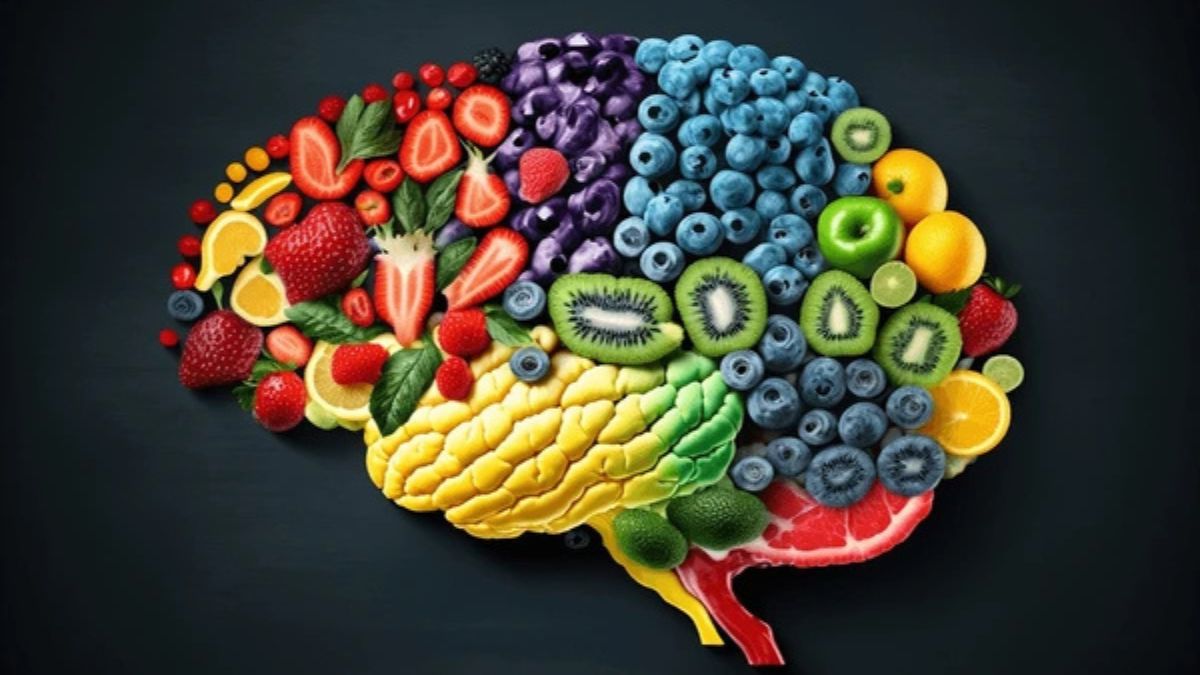HEALTH
Brain Food 101: A Guide to Dietary Choices for Long-Lasting Memory Health

In today’s fast-paced world, maintaining cognitive health and memory function is more essential than ever, and nutrition plays a pivotal role in this endeavor. A diet abundant in antioxidants, omega-3 fatty acids, and other vital nutrients can significantly contribute to brain health, potentially mitigating the risk of memory decline.
As we delve into this guide on brain food, we aim to empower you with knowledge to make informed dietary choices that support long-lasting memory health. By understanding the impact of nutrition on cognitive function, you can take proactive steps to enhance your brain’s performance and longevity.
The Role of Antioxidants
Antioxidants are powerful compounds that combat oxidative stress, a major contributor to cognitive decline. Found in colorful fruits and vegetables like blueberries, spinach, and kale, these nutrients help protect brain cells from damage. Incorporating a variety of antioxidant-rich foods into your diet not only supports brain health but also promotes overall well-being.
Furthermore, studies suggest that a diet high in antioxidants may reduce the risk of neurodegenerative diseases. Green tea, dark chocolate, and nuts are excellent sources that are easy to include in your daily routine. Consistent intake of these foods can contribute to improved memory function and cognitive clarity.
By focusing on antioxidant-rich foods, you may help lower the risk factors associated with memory loss. It’s a simple yet effective dietary choice that can have long-lasting impacts on your cognitive health. Incorporate a rainbow of fruits and vegetables to maximize these benefits and support your brain’s resilience.
Importance of Omega-3 Fatty Acids
Omega-3 fatty acids are essential fats crucial for maintaining brain structure and function. Found in fatty fish like salmon, mackerel, and sardines, these nutrients play a significant role in cognitive health, particularly as we age. Regular consumption can improve memory, focus, and overall brain performance.
Research indicates that omega-3s may slow age-related cognitive decline and reduce the risk of Alzheimer’s disease. For those who prefer plant-based options, flaxseeds, chia seeds, and walnuts are excellent sources of omega-3 fatty acids. Consuming these foods regularly supports memory function and can enhance mental clarity.
Incorporating omega-3-rich foods into your diet is a proactive way to support brain health. Aim for at least two servings of fatty fish per week, or consider a high-quality supplement if you’re unable to meet dietary recommendations. These small changes can foster long-term cognitive benefits and protect against memory impairment.
Benefits of Whole Grains
Whole grains provide sustained energy and play a vital role in cognitive functions. Foods like oats, quinoa, and brown rice are rich in fiber and other nutrients that maintain steady blood sugar levels, ensuring optimal brain performance. They help fuel cognitive processes and enhance concentration and memory.
Additionally, whole grains are a good source of vitamin E, an antioxidant linked to brain health. Consuming whole grains can improve overall cardiovascular health, which in turn supports brain function. This integral nutrient assists in reducing inflammation and oxidative stress in the brain.
Including whole grains in your diet can have a positive impact on memory retention and mental acuity. Swap refined grains for their whole counterparts to boost nutrient intake and promote long-lasting cognitive health. This simple adjustment can contribute to a more alert and focused mind.
The Power of Leafy Greens
Leafy greens like spinach, kale, and Swiss chard are nutritional powerhouses packed with vitamins and minerals essential for brain health. These greens are rich in vitamins C, K, and folate, which have been associated with better cognitive function and memory retention.
Regular consumption of leafy greens can decrease the risk of cognitive decline due to their neuroprotective properties. They promote blood flow to the brain, supporting memory and cognitive processes. Whether in salads, smoothies, or sautés, leafy greens are versatile and easy to incorporate into meals.
Including a variety of leafy greens in your diet is a straightforward way to enhance cognitive performance. Aim to consume these vegetables multiple times a week to harness their full benefits. Their nutrient density supports memory health and overall brain vitality.
Final Thoughts
Incorporating a variety of nutrient-dense foods into your diet is a proactive approach to maintaining memory health. Antioxidants, omega-3 fatty acids, whole grains, and leafy greens each play a significant role in supporting cognitive function. As research in this area progresses, including promising findings from research studies, such as Lilly Alzheimer’s research clinical trials, it’s clear that nutrition remains a key factor in promoting brain longevity.
While maintaining a brain-healthy diet is essential, it’s also important to stay informed about other advances in memory health. Diet and scientific research together offer hope in the fight against cognitive decline.
As studies like Alzheimer’s disease clinical trials continue to shed light on preventative and therapeutic strategies, adopting healthy dietary choices is a step everyone can take today. By prioritizing nutrition, you’re investing in your brain’s long-term health and function.
HEALTH
Living Well in Later Years: Lifestyle Tips for the Elderly

Aging brings change, but it doesn’t have to slow anyone down. With the right habits, seniors can stay active, sharp, and independent. It’s not just about living longer, it’s about living better. Small changes in daily routines can improve both mood and mobility. Staying connected and making time for health goes a long way. It helps to focus on what’s still possible rather than what’s out of reach. Start making those changes today with these helpful lifestyle tips for the elderly.
Stay Physically Active
Regular movement helps keep joints flexible and muscles strong. Simple activities like walking or stretching are easy to add to a daily routine. Light exercise can also help with sleep and energy levels.
Staying active lowers the risk of heart issues and improves balance. Even gardening or household chores count as movement. The key is consistency over intensity.
Keep the Mind Sharp
Mental exercises are just as important as physical ones. Reading, puzzles, or learning something new helps keep the brain alert. Social interaction also keeps the mind engaged.
Avoid long hours of isolation to prevent mental decline. A daily habit of learning or conversation boosts memory and mood. These small actions can help maintain mental sharpness over time.
Focus on a Balanced Diet
What you eat affects how you feel and function. Seniors should aim for meals rich in fiber, vitamins, and lean proteins. Stay hydrated and limit processed foods.
A well-balanced diet supports brain and heart health. It also helps with digestion and energy. Food choices can play a major role in daily well-being.
Prioritize Sleep and Rest
Rest is necessary for healing and energy. Set a regular sleep schedule that suits your body’s natural rhythm. Avoid caffeine or heavy meals before bedtime. Keep the bedroom dark and quiet to improve sleep quality.
A short nap during the day is fine, but too much daytime sleep may affect night rest. Good sleep habits lead to better focus and strength.
Build Strong Social Connections
Spending time with others helps reduce stress and loneliness. Friends, family, or even group activities can give life meaning. Community centers and clubs are great places to meet new people.
Staying socially active also supports emotional health. Try to stay in touch even with short visits or phone calls. This is where insights into senior lifestyle trends show how important connection is to overall wellness.
Stay on Top of Medical Needs
Regular checkups help prevent small issues from becoming bigger. Keep track of medications and understand how they work. Talk to your doctor about any changes in how you feel.
Preventive care like screenings and vaccines are important. Staying informed gives peace of mind. Health care should be part of the routine, not just a reaction.
Discover Later Years Lifestyle Tips for the Elderly
A fulfilling senior life is within reach. It starts with small steps in the right direction. Focus on habits that support the body, mind, and relationships.
Keep routines simple and sustainable. It’s never too late to build a healthier lifestyle. Use these tips to make every day count. Growing older can still mean growing well.
Here to explore more? Our blog’s got you covered.
HEALTH
Expert Plastic Surgeons Transforming Beauty and Confidence

Looking good often leads to feeling good. Many people choose plastic surgery to enhance their beauty and boost their self-esteem.
But choosing the right plastic surgeons are not easy. It requires careful research and consideration. This article will guide you through important tips to help you find an expert plastic surgeon who can transform your appearance and improve your confidence.
Check the Surgeon’s Credentials
The first step in finding an expert plastic surgeon is to check their credentials. Make sure the surgeon is board-certified by a recognized medical board.
Certification proves that the doctor has the right training and skills to perform plastic surgery safely. You can visit medical board websites to verify their license and check for any past complaints or issues.
Look at Before and After Photos
A good way to measure a plastic surgeon’s skill is by looking at their previous work. Most surgeons have photo galleries of past patients who have had similar procedures. Study these photos closely.
Look at the changes made, the natural look of the results, and whether the outcomes meet your expectations. These photos can give you a clear idea of the surgeon’s ability to enhance beauty while maintaining a natural appearance.
Read Patient Reviews and Testimonials
Reading what past patients say can help you decide if a surgeon is right for you. Look for reviews on websites, social media, and clinic pages. Positive reviews often highlight the surgeon’s skill, bedside manner, and how well they handle questions and concerns.
Be cautious of any surgeon who has many negative reviews or no reviews at all. Honest feedback from other patients gives you insight into the overall experience and satisfaction rate.
Consult and Ask the Right Questions
Booking a consultation is an important step in the decision-making process. During your consultation, ask about the procedure, the risks, the recovery time, and what results to expect. It is also a good time to see if you feel comfortable with the surgeon.
Good surgeons are patient, informative, and honest. They should not pressure you or make unrealistic promises. Also, ask if they offer non-invasive body treatments, especially if you are looking for options with shorter recovery times and less risk.
Consider the Clinic’s Facility and Staff
An expert surgeon should operate in a clean, accredited clinic or hospital. Make sure the facility meets safety standards and has modern equipment. Friendly and professional staff also make a big difference in your experience.
They help with scheduling, follow-ups, and answering questions. A well-organized and supportive team reflects a high level of care and professionalism from the surgeon and clinic.
All About Expert Plastic Surgeons
Choosing the right plastic surgeon is a big decision. Your safety, beauty, and confidence are at stake, so take your time and do the necessary research. Check credentials, review past work, read patient reviews, ask questions, and visit the facility.
These steps will help you find an expert who can deliver natural, beautiful results and improve your self-confidence. With the right surgeon, your journey to enhancing your appearance will be safe, smooth, and satisfying.
Looking for more tips and ideas? We’ve got you covered. Check out some of our other posts now.
HEALTH
What You’ll Learn in CPR & First Aid Training Courses

Have you ever wondered what you would do if someone collapsed in front of you or had a serious injury? It’s a scary thought, but being prepared makes a huge difference. CPR & First Aid training courses teach you exactly how to handle emergencies like this.
In this blog post, you’ll discover what skills you’ll learn, how these courses work, and why this training is so important. By the end, you’ll feel ready to take the next step toward saving lives.
Learn to Act Fast in Emergencies
One of the first things you’ll learn in CPR & First Aid training is how to stay calm when an emergency happens. These courses show you how to think clearly and take action when seconds matter. Whether someone has trouble breathing, is bleeding badly, or has passed out, knowing what to do right away can help save their life.
You’ll learn how to assess the situation, check for danger, and start helping before professionals arrive. These steps can make all the difference.
Discover the Power of CPR
CPR stands for Cardiopulmonary Resuscitation. It sounds complicated, but you’ll learn that it’s easy to do. CPR is a method used when a person’s heart stops beating.
You’ll find out how to push down on the chest in a steady rhythm and how to give breaths if needed. These actions help move oxygen through the body until help comes. CPR is a lifesaving skill, and anyone can do it once they are trained.
Understand How to Use an AED
An AED is a device that gives a shock to the heart to help it start beating again. During your training, you’ll learn how to use it step by step. The machine talks to you and tells you what to do, which makes it easier.
You’ll also learn where to find AEDs in public places and why quick use is so important. Using an AED right away can increase a person’s chances of survival, and you’ll be ready to do just that.
Learn to Handle Common Injuries
Every day, accidents happen all the time. Someone might cut themselves, fall, or have a burn. In CPR & First Aid training, you’ll learn how to help with these injuries.
You’ll find out how to clean and cover a wound, treat a burn, or wrap a sprain. You’ll also learn what not to do so you don’t make things worse. Knowing how to give the right care right away helps someone feel better and heal faster.
Be Ready for Choking and Allergic Reactions
Choking is another emergency that can happen suddenly. These courses show you how to spot the signs and what to do to help. You’ll learn how to perform back blows and the Heimlich method.
Allergic reactions can also be dangerous. You’ll learn how to use an epinephrine auto-injector and how to help the person stay safe until help comes. These are real situations that anyone could face, and now you’ll know what to do.
If you’re curious about even more topics covered in these lessons, get more info by visiting your local training center or health organization.
First Aid Training: The Power to Save Lives
Taking CPR & First Aid training courses gives you the skills to help others during some of life’s scariest moments. You don’t need to be a doctor or nurse. Just knowing what to do during an emergency can save lives.
These courses help prepare you for real-life emergencies in a simple, hands-on way. Did this guide help you? Browse the rest of this section for more advice on a variety of topics.
-

 HEALTH1 year ago
HEALTH1 year agoIntegrating Semaglutide into Your Weight Loss Plan: A Practical Guide
-

 HOME IMPROVEMENT1 year ago
HOME IMPROVEMENT1 year agoHow to Choose the Perfect Neutral Area Rug for Every Room
-

 LAW1 year ago
LAW1 year agoPost-Divorce Considerations in California: Modifications and Long-Term Planning
-

 LAW1 year ago
LAW1 year agoTeenage Drivers and Car Accidents in California: Risks and Parental Liability
-

 CONSTRUCTION1 year ago
CONSTRUCTION1 year agoConstruction Site Safety Regulations in New York and Your Rights as a Worker
-

 FINANCE1 year ago
FINANCE1 year agoDigital Asset Management in Florida Estate Planning
-

 LAW1 year ago
LAW1 year agoKentucky’s School Football: Concussions, Injuries, and Legal Options
-

 LAW1 year ago
LAW1 year agoGang Activity and Criminal Charges in CA: Protecting Your Rights


